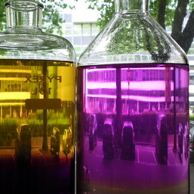AndyForesterAmber
Amber Calculations on 1W7S
Back to main - https://www.ch.ic.ac.uk/wiki/index.php/AndyForester
Full 1W7S amber input is in "though Leap into gassview" folder on the desktop
Issues with this file are:
- slightly non-0 charge on CSY residue
- no water molecules anywhere
Energy calculations
These run locally in 2 seconds and compute the energy fine - simple summation of terms
Optimisation
These run on CX1 using 6000MB memory and 1 processor in roughly 4 hours and 5000 steps
Attempt to run the calculation on 2 processors witht 7000MB memory - time should be halfed but CPU time remains around 4 hours.
Issues with the optimisation:
- Not a smooth start to the energy profile - jump from -2 to 200 kJ/mol! - this smooths out
Visualising whats changed
- VMD allows overlay of the 2 structures (start and finish) so we can see whats moved
- It also has a RMS fit to calculate some "fit factor"
- Can also print out a distance matrix using 3rd party script in VMD tcl console. This creates a full matrix/surface.
- I and Mike wrote scripts to pull the diagonal out of the file so we are comparing each residue with itself.
- This plots the classic movement per residue - BASED ON CENTER OF MASS.
Frequency
The optimised file can be submitted for a frequency calculation using only Amber. Questions to answer about this are:
- Do H and L ONIOM tags get interpreted for Amber only calculations (giving % frequency in the diff regions)?
- Can this calculation be run in parallel NProc=2?
- Does the Chk file load in Gaussview? How large is it?
The initial frequency calculation ran successfully but created a 1.6Gb text file which made reading it difficult.
Answer to the ONIOM tag question:
- Without ONIOM tags - (opt freq) no split between model/real vibrations
- With ONIOM tags - (opt freq) no split between model/real vibrations
- With ONIOM tags - (freq) split between model/real vibrations
It seems Gaussian does recognize the ONIOM split in pure frequency calculations even if no ONIOM method is being used.
